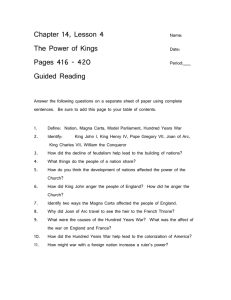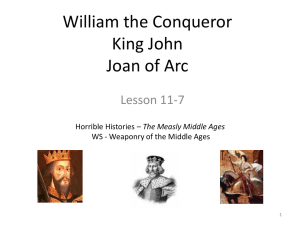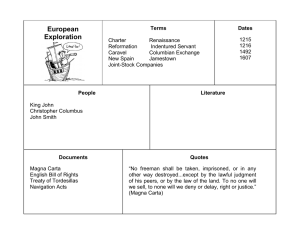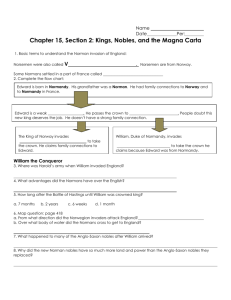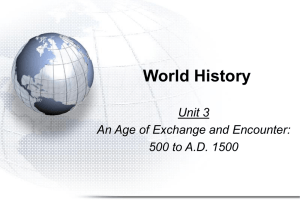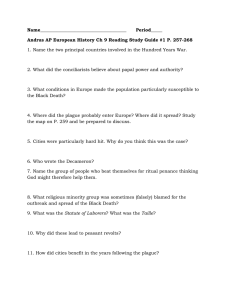Hundred Years War Monday, July 11, 2016
advertisement
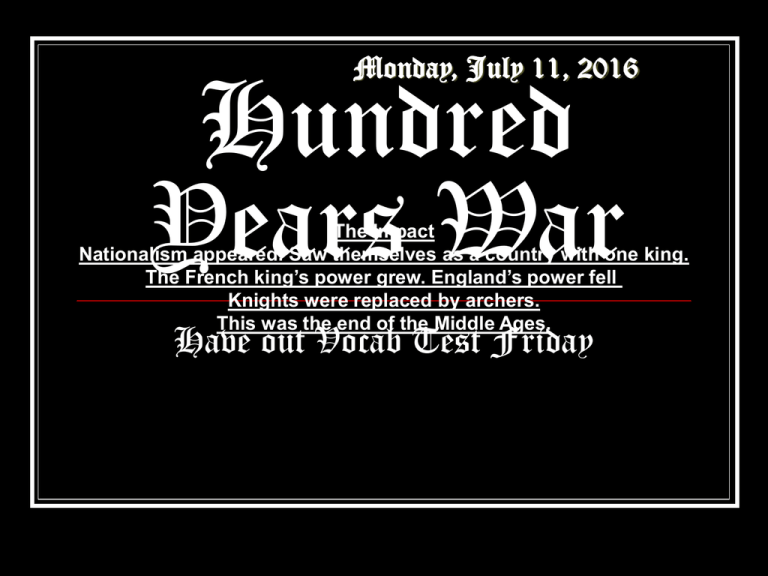
Monday, July 11, 2016 Hundred Years War The Impact Nationalism appeared. Saw themselves as a country with one king. The French king’s power grew. England’s power fell Knights were replaced by archers. This was the end of the Middle Ages. Have out Vocab Test Friday England Kingdoms on Britain were made up of the Anglo-Saxons. They shared a common language and culture. In A.D. 886 an Anglo-Saxon leader by the name of Alfred The Great was able to unite these kingdoms into one nation, which he called Angleland. This would later be changed to England. The last Anglo – Saxon ruler Edward the Conqueror died in 1066 CE. After his death, there was a struggle for power. William the Conqueror In 1066 CE,a man by the name of William The Conqueror asserted his right to rule England. William was Edward’s cousin, and lived in Normandy, France. He was a vassal, or lord to the king of France, and had many vassals, or lords under himself in Normandy. The Battle of Hastings took place on 14 October 1066. It was the decisive Norman victory Using his influence, William gathered an army of 6,000 soldiers, which he used to conquer England. After placing himself on the throne, he rewarded his vassals from Normandy with the lands of many of the English nobles. The monarchy continued under his descendants until 1215. Magna Carta By 1215,King John lost territory to the French, which upset many. He also increased taxes, and oppressed many of his people, arresting them without trials. Many of the nobles in England were tired of losing their power, and were concerned by the tyrant-like behavior of John, came together, and wrote a document called the Magna Carta. The Magna Carta is one of the most important documents in history. It guaranteed the people certain rights, and bound the king to certain laws This was the beginning of the reforms leading to a Parliament and the decrease of the authority of the monarchy. Hundred Years War Because William the Conqueror had been a powerful leader in Normandy, he claimed both England, as well as much of France as his kingdom. Later English kings maintained their right to rule parts of France. This created a great deal of resentment In 1328 the king of France died without leaving a direct heir. The French were not ready to be ruled by an English King and went to war. A war that would last from A.D. 1337 until A.D. 1453 At first it appeared as though England would win the war. Their superior technology and strategies lead them to victory in a series of battles. After more than one hundred years of fighting, the French were eventually able to declare victory of the English. The Impact •Nationalism appeared. Saw themselves as a country with one king. •The French king’s power grew. England’s power fell •Knights were replaced by archers. •This was the end of the Middle Ages. Joan of Arc Joan of Arc (c. 1412 - 1431) led the French army to victories over the English, resulting in the coronation of Charles VII as king of France. Joan claimed to have had visions from God directing her to defeat the English. She was captured by the English forces and executed for heresy at the age of 19. Charles VII Joan of Arc at the Siege of Orleans
